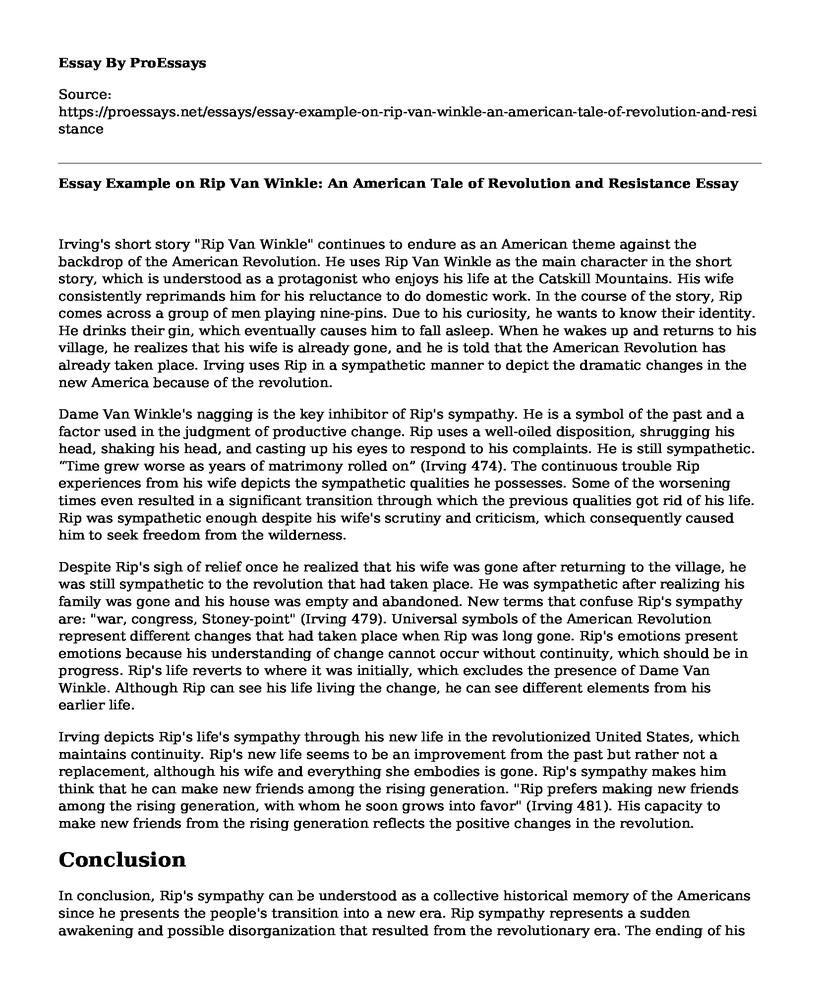Irving's short story "Rip Van Winkle" continues to endure as an American theme against the backdrop of the American Revolution. He uses Rip Van Winkle as the main character in the short story, which is understood as a protagonist who enjoys his life at the Catskill Mountains. His wife consistently reprimands him for his reluctance to do domestic work. In the course of the story, Rip comes across a group of men playing nine-pins. Due to his curiosity, he wants to know their identity. He drinks their gin, which eventually causes him to fall asleep. When he wakes up and returns to his village, he realizes that his wife is already gone, and he is told that the American Revolution has already taken place. Irving uses Rip in a sympathetic manner to depict the dramatic changes in the new America because of the revolution.
Dame Van Winkle's nagging is the key inhibitor of Rip's sympathy. He is a symbol of the past and a factor used in the judgment of productive change. Rip uses a well-oiled disposition, shrugging his head, shaking his head, and casting up his eyes to respond to his complaints. He is still sympathetic. “Time grew worse as years of matrimony rolled on” (Irving 474). The continuous trouble Rip experiences from his wife depicts the sympathetic qualities he possesses. Some of the worsening times even resulted in a significant transition through which the previous qualities got rid of his life. Rip was sympathetic enough despite his wife's scrutiny and criticism, which consequently caused him to seek freedom from the wilderness.
Despite Rip's sigh of relief once he realized that his wife was gone after returning to the village, he was still sympathetic to the revolution that had taken place. He was sympathetic after realizing his family was gone and his house was empty and abandoned. New terms that confuse Rip's sympathy are: "war, congress, Stoney-point" (Irving 479). Universal symbols of the American Revolution represent different changes that had taken place when Rip was long gone. Rip's emotions present emotions because his understanding of change cannot occur without continuity, which should be in progress. Rip's life reverts to where it was initially, which excludes the presence of Dame Van Winkle. Although Rip can see his life living the change, he can see different elements from his earlier life.
Irving depicts Rip's life's sympathy through his new life in the revolutionized United States, which maintains continuity. Rip's new life seems to be an improvement from the past but rather not a replacement, although his wife and everything she embodies is gone. Rip's sympathy makes him think that he can make new friends among the rising generation. "Rip prefers making new friends among the rising generation, with whom he soon grows into favor" (Irving 481). His capacity to make new friends from the rising generation reflects the positive changes in the revolution.
Conclusion
In conclusion, Rip's sympathy can be understood as a collective historical memory of the Americans since he presents the people's transition into a new era. Rip sympathy represents a sudden awakening and possible disorganization that resulted from the revolutionary era. The ending of his story presents the change for the better as long as continuity remains.
Work Cited
Irving, Washington. Rip van winkle and the legend of sleepy hollow. Macmillan and Company, 1893.
Cite this page
Essay Example on Rip Van Winkle: An American Tale of Revolution and Resistance. (2023, Aug 24). Retrieved from https://proessays.net/essays/essay-example-on-rip-van-winkle-an-american-tale-of-revolution-and-resistance
If you are the original author of this essay and no longer wish to have it published on the ProEssays website, please click below to request its removal:
- Literary Analysis Essay on Joseph Conrad's Heart of Darkness
- Factors That Led to American Victory in WW2 Essay Example
- Article Analysis Essay on The Space Traders by Derrick Bell
- Essay Example on Esmarch: From Tonning to Military Surgeon
- Comparing Seamus Heaney & Roy Liuzza's Translations of Beowulf - Essay Sample
- Essay Example on Time Bomb: Hidden Perspectives of Revenge
- Essay Example on Israeli-Palestinian Conflict: From 1920s to 1948







